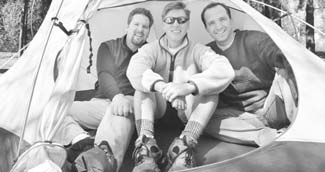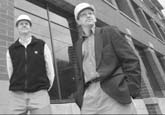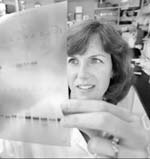Story by Clint Kelly, Connie McDougall and Hope McPherson
Photos by Jimi Lott
 <spu alumni take the lead in the high-tech marketplace>
<spu alumni take the lead in the high-tech marketplace>
Seattle Pacific University
is situated at the very center of a worldwide phenomenon: the high-tech boom. With its Bill Gates Factor, strapping biotech companies and Internet "start-ups" appearing like mushrooms after a rain, the Seattle region is seeing unprecedented growth in technological industries.
According to the Washington Technology Center, the state of Washington leads the nation in the creation of new high-tech companies and in the growth of technology employment. Northwest venture capital investment, an indicator of future business growth, increased 99 percent between 1997 and 1999, but didn't even keep up with demand.
So where do the graduates of Seattle Pacific -- only some of whom majored in computer science -- fit in this wired world? Many, we discovered, are helping to define it. Here are a few of their stories.
Riding the Merger Coaster
Just how fast is fast in the high-tech world? When US Web acquired Nutley Systems in 1998, the family-owned start-up was scarcely two years old. Brothers Dan, Byron and Paul were all Seattle Pacific University graduates ('81, '87 and '87 respectively). They had joined forces with their father, Hugh, retired SPU professor of electrical engineering, to act as Internet consultants and to provide a spectrum of services related to software development.
Fast as they could point and click, they were snatched up by USWeb, which merged with a still larger company and became USWeb/CKS, and most recently morphed into marchFIRST, Inc. It's been a wild ride, but with the newly acquired corporate muscle, the Nutleys can now compete on larger contracts and continue to do what they did more efficiently. Dan, for example, has provided software consultation to Boeing on its Delta IV rocket program.
 "The high-tech field is so dynamic, you can be left behind pretty quickly," says Byron, a managing partner at
marchFIRST. "At SPU you learn to think on your feet, learn from your mistakes and keep improving."
"The high-tech field is so dynamic, you can be left behind pretty quickly," says Byron, a managing partner at
marchFIRST. "At SPU you learn to think on your feet, learn from your mistakes and keep improving."
One important factor fueling the Nutley success story is the strong supply of high-caliber technicians available from Seattle Pacific. They include Jim Takata '87, one of the company founders, and Martin Krienke '86, who heads the engineering group. "The people we got are extremely good, and many are still with the company," says Byron.
But, he adds, it was mostly their reliance on God that got them through the early days "when everything wasn't coming up roses."
Dad at Microsoft
 As manager of mergers, acquisitions and divestitures for the corporate behemoth
Microsoft, Dana Green logs 60- and 70-hour weeks integrating
acquired companies and helping shape the
future in computer technology. In almost nine years with the company, the 1980 graduate of Seattle Pacific University has managed hundreds of employees and worked in a broad range of departments.
As manager of mergers, acquisitions and divestitures for the corporate behemoth
Microsoft, Dana Green logs 60- and 70-hour weeks integrating
acquired companies and helping shape the
future in computer technology. In almost nine years with the company, the 1980 graduate of Seattle Pacific University has managed hundreds of employees and worked in a broad range of departments.
He loves the constant change in a demanding industry. But it can take its toll on family -- his wife, Lisa; son, Kyle; and daughter, Hilary. They need him to connect with them and, when at home, to shut off the engine of work.
Green looked around and saw that among the 30,000-plus employees of Microsoft were other husbands and fathers in need of support and resources to help them bring a healthy balance to work and family. Thus was born "MS Dads," also known as "Dads at Microsoft."
Green and a co-worker placed a small ad in a Microsoft newsletter and hoped for a first turnout of eight or nine. Sixty enthusiastic men showed up. Today, they count 140 participants, with new ones added regularly.
"Doors were opened and the company embraced the idea," says Green. The Human Resources Department at Microsoft helps fund and advertise key events, workshops and family enrichment speakers. Green knows of instances where daily work and living patterns have been modified, even to the extent of employees relocating closer to Microsoft to keep their families near.
"The point is to provide resources to employees and give them encouragement," says Green. "I and other dads have found that our kids need more of us. They need us to be there emotionally, too. What's good for the family is good for the company."
Speaking the Web's Language
Graduating from Seattle Pacific University in 1992, Katherine Inman took her newly earned secondary English teaching certificate to rural Washington. But soon the school where she taught faced budget cuts. Caught in a workforce reduction, Inman returned to Seattle, where her career took an unexpected high-tech turn.
"I planned to go back into teaching, but a friend who worked at Microsoft called and said they needed somebody for three weeks," recalls Inman. "I did that -- and stayed for three and a half years." She's been in the "e-workforce" ever since.
 In a world where software developers and editorial staff
often speak two different languages, Inman quickly learned to speak both fluently. Last year, she was
recruited to be content manager for Acadio, a Seattle start-up that provides con-
tinuing education resources via its Web site, Acadio.com.
In a world where software developers and editorial staff
often speak two different languages, Inman quickly learned to speak both fluently. Last year, she was
recruited to be content manager for Acadio, a Seattle start-up that provides con-
tinuing education resources via its Web site, Acadio.com.
Forty percent of American adults take part in continuing education each year, and Acadio makes available a host of resources from curriculum stalwarts such as McGraw Hill, Time Warner and Berlitz. "Acadio's goal is to spark a desire for lifelong learning," says Inman. "It was a big draw for me."
Inman manages Acadio's publishing team and writes specifications from which developers create databases. She then trains her team to use those databases.
Although no longer in the classroom, Inman says SPU's liberal arts-based education is an excellent foundation for success in the high-tech industry. "People who have logic and problem-solving skills are much more valuable than people who have computer science skills but aren't able to see the whole picture."
Members of the Net Generation
It's a new world out there. How else to explain why three young Seattle Pacific University alumni ended up heading one of the top Internet start-up companies of its kind in the nation?
And they did it in less than two years.
Launched in March 1999, Altrec.com is e-commerce with a difference, says founder and CEO Mike Morford '92. Yes, it sells outdoor clothing, gear and accessories, but that's just the start. Altrec.com, says Morford, offers a "lifestyle," a community that delivers information; feature articles; sport and travel advice; and live, online customer service.

Morford credits a "dry run in leadership" at SPU with kick-starting his business savvy.
Shannon Stowell '90, Altrec.com's co-founder and director of business development, majored in biology, then switched from science to business soon after graduating. He's a natural entrepreneur, say his colleagues.
Jim Helmich '92 studied religion at SPU, earned a master's degree in theology, and now heads Altrec.com's Human Services Department.
The trio shares an entrepreneurial streak and abundant, oft-tested, faith. "There's so much instability in this business," says Morford, "that we have to hold on to God."
As a company, they are mission-oriented, explains Helmich. "We really think of ourselves as a liaison between the hectic world and the outdoors."
The prospect of business success is exciting, Stowell says, "but that's not our only goal. No matter what happens, we first want to be good stewards.
Keeping the Dot-Coms On
If the Internet is a virtual superhighway, F5 Networks, Inc. is the infrastructure that keeps it running.
Founded in 1996 by Jeffrey Hussey '83, F5 Networks develops and markets a vital product called BIG-IP, which helps e-commerce sites give their customers a stable experience. With an initial public offering on June 3, 1999, of $10 per share, it closed December 31, 1999, at $114 -- up 1,040 percent. Even with the current high-tech stock price decline, it remains a top Northwest stock and, says one F5 executive, there are good reasons for that.
"As far as I'm concerned, the bonds that begin in college and the foundation of faith and Christianity that SPU brings is a great story," says Brian Dixon '82, F5's director of facilities. "That's what brought Jeff and I together and really helped build this company, as well as a lot of prayer by us and our families."
 After college, Hussey and Dixon (both Seattle Pacific University finance majors) remained friends. In 1996, Hussey, now F5's CEO, recruited Dixon from his position with the Seattle Sonics to become the company's first employee. Today F5 Networks has nearly 300 employees in nine U.S. cities and eight countries, including Japan, Sweden and the United Kingdom.
After college, Hussey and Dixon (both Seattle Pacific University finance majors) remained friends. In 1996, Hussey, now F5's CEO, recruited Dixon from his position with the Seattle Sonics to become the company's first employee. Today F5 Networks has nearly 300 employees in nine U.S. cities and eight countries, including Japan, Sweden and the United Kingdom.
Yet Hussey refuses to let unnecessary high-tech stress infiltrate F5's culture. Family time is as important as the bottom line. "It takes awhile for people coming out of high-pressure environments to understand how our system works," he says. "But it does work. You can't give up everything else in your life for work."
Researcher in the Bio-Boom
 Seattle Pacific University now offers a
degree track in biotechnology, but when Carol Stahlheber Raport graduated in 1982, it didn't exist. In fact, the industry that uses
advanced technology to manipulate biological molecules for medical
and environmental applications was just beginning its phenomenal growth.
Seattle Pacific University now offers a
degree track in biotechnology, but when Carol Stahlheber Raport graduated in 1982, it didn't exist. In fact, the industry that uses
advanced technology to manipulate biological molecules for medical
and environmental applications was just beginning its phenomenal growth.
"Seattle Pacific gave me a solid background in science," Raport recalls. "The small classrooms were wonderful, and I had total access to the professors."
It was the interest in research she developed at SPU that eventually drew her to the biotech field. Now a senior scientist at the ICOS Corporation in Bothell, Washington, Raport uses her scientific and technological skills to investigate ways to block tissue inflammation, a common ailment in diseases such as arthritis or multiple sclerosis.
Biotechnology companies tend to be more focused and respond more quickly than the larger pharmaceutical companies, she says. "We're more willing to take risks. At ICOS, for instance, we don't even have a product on the market yet. All of the money comes from investors, but they believe we have good ideas that will pay off one day."
Rather than competing with her Christian faith, science confirms it, says Raport. "The deeper I go, the more complex it becomes. This is not random. I see signs of a Creator. It's totally miraculous."
Raport decided long ago that her beliefs can strengthen the quality of her work by actually freeing her from assumptions that may taint the scientific method. "There are some things people assume in science that I don't assume," she says. "I'm open to what the data shows me."
![]()

| Please read our
disclaimer.
Send any questions, comments or correspondence about Response to
jgilnett@spu.edu or call 206-281-2051. Copyright © 2000 University Communications, Seattle Pacific University.
Seattle Pacific University |